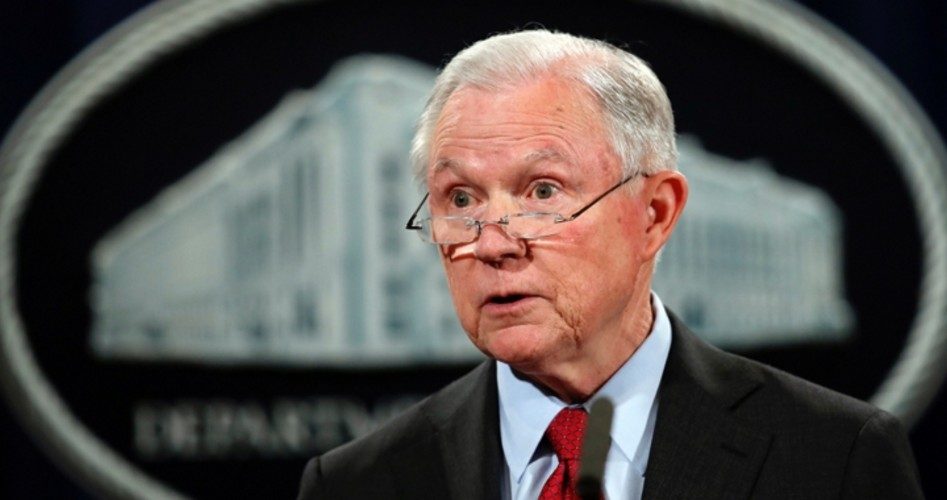
The fallout from the Uranium One scandal is still coming down. While the liberal establishment in both politics and media is busily failing in its efforts to prove collusion between Trump and Russia, Hillary Clinton continues to find herself caught in the crosshairs of multiple investigations into her dealings with Russian interests during her tenure as secretary of state.
As more details of the Uranium One deal — which transferred control of 20 to 25 percent of U.S. uranium to a state-owned Russian interest and lined the pockets of the Clinton foundation with millions of dollars — continue to come to light, the picture that is emerging is one of corruption, illegality, and collusion. And Hillary Clinton is right in the middle of it all. The problem is that the FBI — which was aware of the deal all along — has been less than forthcoming with many of the details uncovered by investigators even before the deal was approved.
That may be getting ready to change.
Attorney General Jeff Sessions (shown) has ordered Justice Department prosecutors to question FBI agents to explain the evidence they found in a now-dormant criminal investigation of the Uranium One deal, according to NBC News, which cited multiple law-enforcement officials.
As NBC News reported last week:
The interviews with FBI agents are part of the Justice Department’s effort to fulfill a promise an assistant attorney general made to Congress last month to examine whether a special counsel was warranted to look into what has become known as the Uranium One deal, a senior Justice Department official said.
As part of the interviews related to that investigation, FBI agents involved have been asked by Justice Department prosecutors over the past few weeks to describe the results of their probe. The agents also “have been asked if there was any improper effort to squash a prosecution,” NBC news cited law-enforcement sources as saying.
The crux of the issue is the 2010 deal — approved by Secretary Clinton and others — that allowed the sale of of U.S. uranium mining facilities to Rosatom State Atomic Energy Corporation, a Russian state-owned company headquartered in Moscow. While it would be bad enough for Secretary Clinton to have approved a deal that would strengthen Russia while weakening the United States, there is more to this scandal than even that. The New York Times reported in 2015 (before Clinton was the Democrat nominee) that more than $40,000,000 in donations were made to the Clinton Foundation in connection with the deal.
For those Democrats looking for evidence of collusion with Russia, looking into a mirror would appear to be a great place to begin. After all, they chose Clinton as their nominee after she sold America out for the money that she appears to have used to control the party and guarantee her nomination.
Like so many other things involving the Obama administration in general and Clinton specifically, the Uranium One deal appears to have included an uninterrupted series of actions that were corrupt and illegal. As Newsweek reported in October, “The Obama administration signed a controversial nuclear deal with Moscow despite prior FBI findings that Russian officials were bribing their way into the U.S. atomic energy industry, according to government documents just published by The Hill.”
And evidence of bribes and kickbacks is not mere conjecture and innuendo (as in the case of allegations against Trump), but is solidly supported by “a confidential U.S. witness working inside the Russian nuclear industry” who gathered “extensive financial records,” made “secret recordings,” and intercepted “emails as early as 2009,” according to The Hill. Moreover:
They also obtained an eyewitness account — backed by documents — indicating Russian nuclear officials had routed millions of dollars to the U.S. designed to benefit former President Bill Clinton’s charitable foundation during the time Secretary of State Hillary Clinton served on a government body that provided a favorable decision to Moscow, sources told The Hill.
The racketeering scheme was conducted “with the consent of higher level officials” in Russia who “shared the proceeds” from the kickbacks, one agent declared in an affidavit years later.
One question Attorney General Sessions wants answered is how — with everything the FBI knew at the time — the deal was allowed to be approved. He may also look into how Clinton’s foundation profited from the deal.
As NBC News reported last week:
A senior law enforcement official who was briefed on the initial FBI investigation told NBC News there were allegations of corruption surrounding the process under which the U.S. government approved the sale. But no charges were filed.
But at least as far back as September 2016, Donald Trump and others have called the deal corrupt and called for Clinton to be investigated. And last week, Assistant Attorney General for Legislative Affairs Stephen Boyd sent a letter to Representative Bob Goodlatte (R-Va.), chairman of the House Judiciary Committee, saying that DOJ lawyers would be making recommendations to Sessions “about whether an investigation should be opened or expanded, or whether a special counsel should be appointed” to investigate the matter, according to last week’s report by NBC News.
This is not the only investigation into Clinton’s role in the Uranium One deal. As The New American reported in October, top House Republicans have already launched their own probes into both this matter and her e-mail scandal. And while Clinton claims to be unconcerned, she appears quite concerned. And she likely has good reason to be.
Photo of Attorney General Jeff Sessions: AP Images




